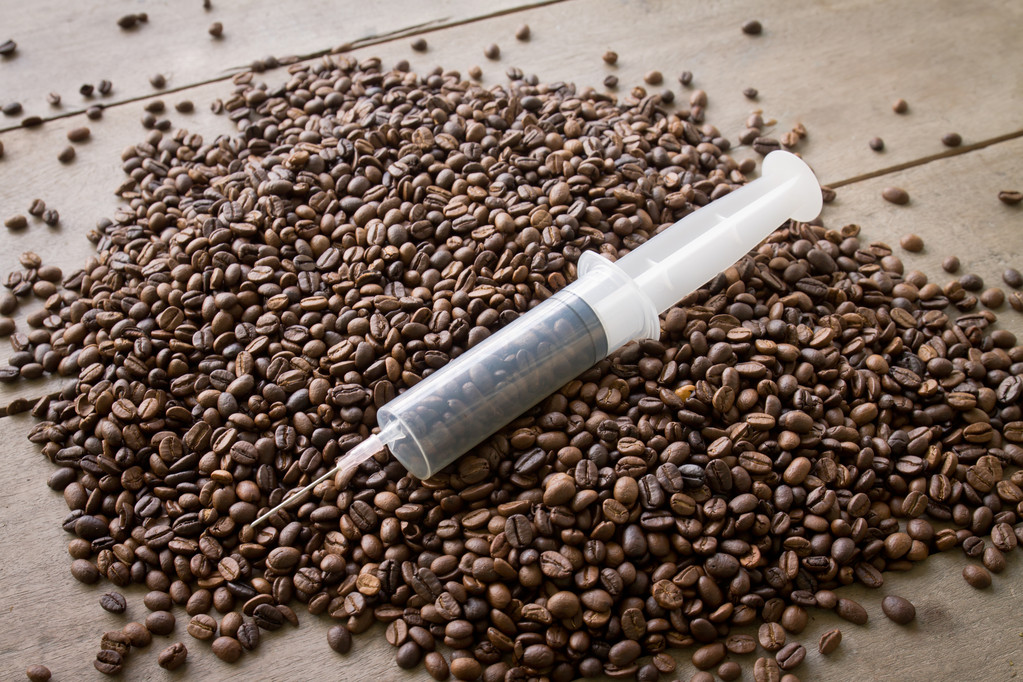Caffeine: Energy Booster Explained
09/13/2023

Welcome, dear reader, to the world of caffeine, the most widely consumed psychoactive substance on the planet! This magical molecule has been keeping us humans alert and energized for centuries. But what exactly is it? How does it work its magic? And what are the pros and cons of consuming it? Buckle up, because we're about to dive deep into the fascinating world of caffeine.
Whether you're a coffee connoisseur, a tea enthusiast, or a soda sipper, you've probably experienced the invigorating effects of caffeine. But have you ever wondered what's happening inside your body when you consume it? Well, wonder no more! By the end of this glossary article, you'll be a caffeine expert.

The Chemistry of Caffeine
Let's start with the basics. Caffeine is a naturally occurring compound found in the seeds, nuts, or leaves of certain plants. These plants use caffeine as a pesticide, as it can paralyze and kill insects that try to feast on them. But for us humans, caffeine is a source of energy and alertness.
Chemically speaking, caffeine is an alkaloid. Alkaloids are a group of naturally occurring compounds that contain mostly basic nitrogen atoms. This group also includes other well-known substances like morphine, quinine, and nicotine. But unlike these substances, caffeine consumption is legal and unregulated around the world.
Structure of Caffeine
Caffeine is a white crystalline purine, a term that refers to its specific chemical structure. It consists of a xanthine molecule (comprising two fused rings of oxygen and nitrogen atoms) attached to three methyl groups. These methyl groups are what allow caffeine to bind to its targets in the human body and exert its stimulating effects.
Despite its complex structure, caffeine is water-soluble. This means it can easily be extracted from plants and added to drinks and food. It's also fat-soluble, which allows it to cross the blood-brain barrier and affect the central nervous system.
Sources of Caffeine
Caffeine is found in over 60 plants worldwide. The most famous of these is the coffee plant, which is native to tropical regions of Africa. The caffeine in coffee is concentrated in its beans, which are roasted, ground, and brewed to make the beverage we all know and love.
Tea leaves, cocoa beans, kola nuts, and guarana berries also contain caffeine. These plants are used to make a variety of caffeinated products, including tea, chocolate, energy drinks, and certain medications.
How Caffeine Works
Now that we know what caffeine is and where it comes from, let's explore how it works. When you consume a caffeinated beverage, the caffeine molecules quickly enter your bloodstream through the lining of your mouth, throat, and stomach. Once in the blood, they travel to the brain, where they have a stimulating effect.
The primary mechanism of action of caffeine is as an antagonist of adenosine receptors in the brain. Adenosine is a neurotransmitter that promotes sleep and relaxation, and by blocking its receptors, caffeine can reduce tiredness and increase alertness.
Effects on the Central Nervous System
By blocking adenosine receptors, caffeine affects the central nervous system in several ways. First, it increases the release of dopamine, a neurotransmitter associated with pleasure and reward. This can elevate mood and provide a sense of well-being.
Second, caffeine stimulates the release of adrenaline, the "fight or flight" hormone. This can increase heart rate, blood pressure, and blood flow to muscles, all of which can contribute to feelings of energy and alertness.
Effects on Physical Performance
Because of its effects on the central nervous system, caffeine can enhance physical performance. It can increase endurance, reduce fatigue, and improve muscle strength. This is why caffeine is often included in pre-workout supplements and energy drinks.
Additionally, caffeine can enhance cognitive performance. It can improve reaction time, vigilance, attention, and problem-solving skills. This makes caffeine a popular choice for students, professionals, and anyone else who needs to stay alert and focused.
The Pros and Cons of Caffeine
Like any substance, caffeine has its pros and cons. On the positive side, it can enhance physical and cognitive performance, elevate mood, and provide a sense of well-being. It's also been associated with a reduced risk of certain diseases, including Parkinson's disease and certain types of cancer.
On the negative side, excessive caffeine consumption can lead to a variety of health problems. These include insomnia, nervousness, restlessness, stomach upset, rapid heartbeat, and muscle tremors. It can also lead to dependence and withdrawal symptoms.
Pros of Caffeine
As we've already mentioned, caffeine can enhance physical and cognitive performance. It can also elevate mood, provide a sense of well-being, and even help with weight loss. Some studies have also suggested that caffeine may reduce the risk of certain diseases, including Parkinson's disease, Alzheimer's disease, and certain types of cancer.
Additionally, caffeine is a rich source of antioxidants, which can help protect cells from damage. It's also been associated with a reduced risk of stroke and diabetes. And let's not forget the social benefits of caffeine! Many of us enjoy meeting friends for a cup of coffee or tea, and these social interactions can contribute to overall well-being.
Cons of Caffeine
While caffeine has many benefits, it's not without its downsides. Excessive caffeine consumption can lead to a variety of health problems, including insomnia, nervousness, restlessness, stomach upset, rapid heartbeat, and muscle tremors. It can also lead to dependence, with withdrawal symptoms like headaches, irritability, and fatigue.
Additionally, some people may be more sensitive to the effects of caffeine than others. For these individuals, even small amounts of caffeine can cause unpleasant side effects. Pregnant women, people with certain medical conditions, and those taking certain medications may also need to limit or avoid caffeine.

Conclusion
So there you have it, folks! That's the lowdown on caffeine, the world's most popular energy booster. Whether you're a coffee lover, a tea drinker, or a soda sipper, now you know exactly what's happening inside your body when you consume this magical molecule.
Remember, like any substance, caffeine should be consumed in moderation. So enjoy your caffeinated beverages, but don't overdo it. And if you ever have any concerns about your caffeine consumption, don't hesitate to talk to your doctor or a healthcare professional.

 Back to Blog
Back to Blog